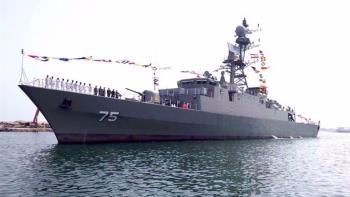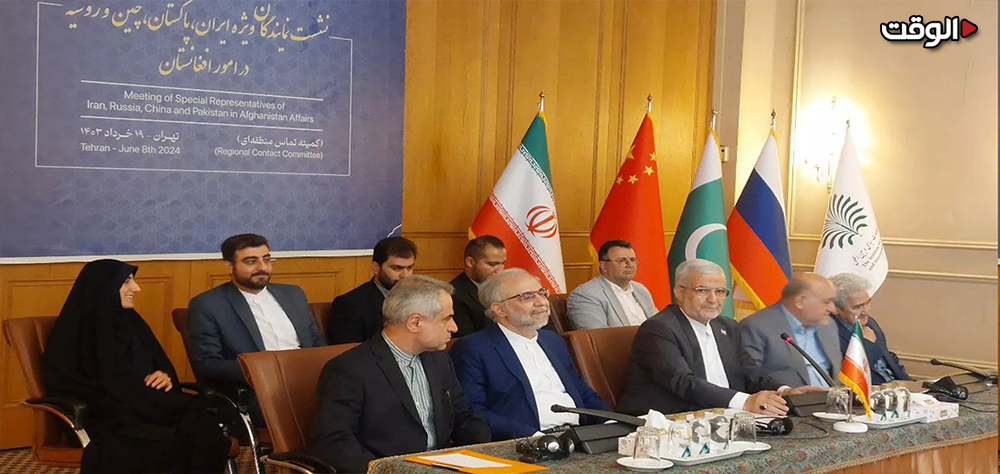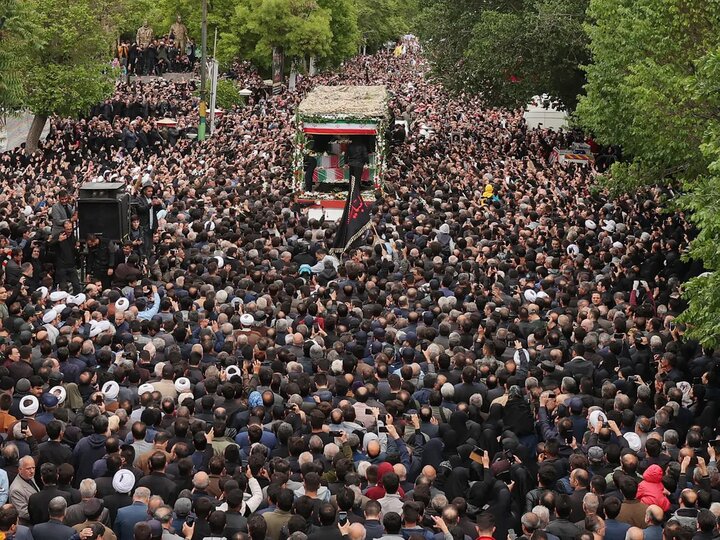Alwaght- Three years after Taliban's takeover of the power in Afghanistan, the course of developments in this country is far away from people and international community's point of satisfaction given the difficult knots in economy, security, and politics.
Meanwhile, since Afghanistan’s internal crises for a long time have had unavoidable impacts on the country's peripheral environment and in a variety of ways challenged the interests of neighboring states, the neighbors have held meetings, especially in the past three years, to find a durable and comprehensive solution to its problems.
To this end, one of the political initiatives of the neighboring countries has been the foundation of "Regional Contact Group" that on Saturday held its second meeting in Tehran with the presence of representatives from Iran, China, Russia, and Pakistan.
The meeting was attended by Hassan Kazemi Qomi, Yue Xiaoyong , Zamir Kabulov, and Asif Durrani, respectively the special envoys of Iran, China, Russia, and Pakistan to Afghanistan.
Earlier, Iran's deputy FM and director of office of South Asia at the Iranian foreign ministry Sayed Rasul Mousavi commented on the goals of the summit, saying: "The consultation of the special representatives of Iran, Pakistan, China and Russia regarding the future of Afghanistan is on the agenda of this meeting... Tehran summit will be a message of peace, stability, and development for Afghanistan and the region in the light of regional cooperation and integration."
First round of this meeting was held in January in Kabul at the suggestion of Iran. Representatives and envoys of regional and neighboring countries attended the meeting.
Tehran meeting is a sequel to Moscow Format meetings that have been held in the past years. The last meeting of Moscow Format was held on September 29, 2023, with its agenda being forming an inclusive government, securing women's rights, and fighting the threat of terrorism in Afghanistan. Participants acknowledged the lack of progress in building a truly inclusive government in Afghanistan. They also asked the current Afghan authorities to provide the necessary conditions to improve the living conditions of the Afghan people, prevent further migration, and provide conditions for the return of migrants.
Inclusive government has been an international demand and obsession since the return of Taliban rule in August 2021, but the Taliban rulers show no willingness to allowing other ethnic groups to participate in the interim government, something working as a roadblock ahead of international recognition of the Taliban administration.
Discussing ways of cooperation with the Taliban in Tehran summit
One of the key necessities in Afghanistan-related regional and international meetings, which seems to have been especially the focus of the Regional Contact Group, is reaching mechanisms of interaction with new rulers of Kabul to help settle the problems in this Central Asian country. Naming special envoys with necessary powers to facilitate periodic meetings bears witness to this matter.
Given the complicated security conditions and terror activities in Afghanistan, as well as challenges arising from drugs production, regional coordination and joint efforts to battle terrorism and drugs by regional states is of great significance. So, the dominant view in the Regional Contact Group is that settlement of these crises and challenges takes interaction with the Taliban government. The group believes that as return of migrants to Afghanistan from Iran and Pakistan took place in coordination with the Taliban government, in other areas such coordination and interaction is crucial.
The neighbors of Afghanistan are unanimous in believing that if the problem of Afghanistan is to be solved, the level of political and economic cooperation with the interim government of the Taliban should also be a priority for these countries so that they can beat the internal crises of this country with the participation of the local government. Strengthening Afghanistan's participation in economic interactions has been one of the most important programs of the four-party bloc to solve Afghanistan's problems.
Recently, Russia said it mulls removing the Taliban from its terror blacklist and also supports its membership in the Shanghai Cooperation Organization (SCO). Afghanistan is currently an observer member of this major bloc and its full accession will provide interactions with other members. The more the neighbors increase their trade and business interactions with Afghanistan, the more they can watch its internal developments.
Due to strategic location, Afghanistan can play an important role in regional trade. Its location on the way of China's Road and Belt Initiative (RBI), or New Silk Road, which bridges the West and East, can facilitate regional trade if Afghanistan conditions smoothen.
In recent years, Iran has tried to expand the trade infrastructure with Afghanistan and by completing the Khaf-Herat railway and developing the Chabahar Port, it has helped Afghanistan easily access regional markets. China, for its part, has taken great steps to connect Afghanistan to the world markets by investing in its energy resources and mines.
The state of being a landlocked country is one of the drivers of radicalism and terrorism in Afghanistan. Regional countries are worried about spillover of Afghanistan insecurity, so, they try to connect it to international routes and high seas and develop its infrastructure and exports in order to eliminate poverty in this country. Chabahar Port and Iran's railway network are the best possible choices for Afghanistan to break its trade an territorial bottlenecks.
Different atmosphere of Regional Contact Group from Doha summits on Afghanistan
One of the important issues in examining the nature of the goals and plans and actions of the Regional Contact Group's meetings is assessment of this regional initiative compared to the international initiative dubbed Doha Summit on Afghanistan which is a rival format working to sieze management of major Afghanistan developments.
Though Doha Summit is held under the auspices of the UN, its main moderator is the West, and mainly the US. Though having withdrawn from Afghanistan after twenty years of occupation, Washington still sees management of Afghanistan developments as being in line with its interests and part of its regional strategy. Given the strategic conflicts of the Western-favored regional geopolitical order with the interests of the China, Russia, and Iran, it is obvious that the three countries' initiative rests on a pessimistic view to the trans-regional interference in Afghanistan affairs under the ruse of helping Afghanistan settle its problems.
The joint effort of the four participants in Tehran summit is reaching a minimum level of agreement given their security concerns over Afghanistan. Iran, Russia, China and Pakistan are highly worried about the political instability in Afghanistan and the spread of extremism from this country to the region, and in the past three years, they have tried, through several meetings, to solve its problems and move the region towards stability.
In general it should be said that though the Taliban have so far failed to meet demands of the international community for an inclusive government, the security and political circumstances in Afghanistan are in a way that invite for international cooperation on this country.
The US-led Western countries have shown that Afghanistan instability does not matter to them and freezing of over $7 billion in Afghanistan assets in the Western banks bears witness to this reality. So, no hopes should be set on the help of the US and its allies that are thousands of kilometers away from Afghanistan. On the other hand, though providing limited financial help, the UN under the influence of the US policies has not taken effective measures to assuage Afghanistan’s challenges. Therefore, the regional countries that are top to receive the impacts of the Afghanistan insecurity spillover should boost cooperation with Islamic Emirate of Afghanistan to save the country from the predicament it is grappling with.



























